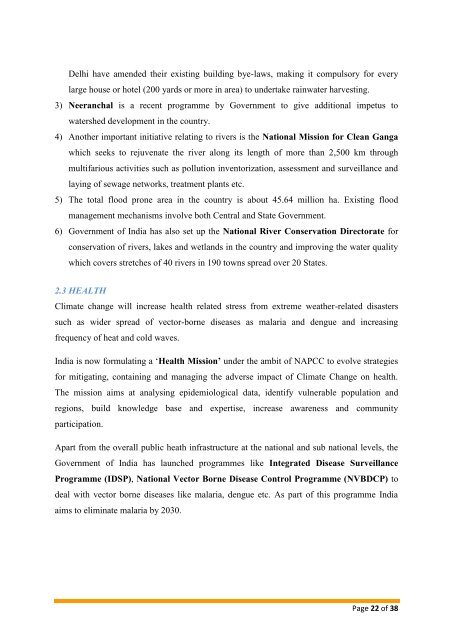INDIA’S INTENDED NATIONALLY DETERMINED CONTRIBUTION
1WsYDcS
1WsYDcS
You also want an ePaper? Increase the reach of your titles
YUMPU automatically turns print PDFs into web optimized ePapers that Google loves.
Delhi have amended their existing building bye-laws, making it compulsory for every<br />
large house or hotel (200 yards or more in area) to undertake rainwater harvesting.<br />
3) Neeranchal is a recent programme by Government to give additional impetus to<br />
watershed development in the country.<br />
4) Another important initiative relating to rivers is the National Mission for Clean Ganga<br />
which seeks to rejuvenate the river along its length of more than 2,500 km through<br />
multifarious activities such as pollution inventorization, assessment and surveillance and<br />
laying of sewage networks, treatment plants etc.<br />
5) The total flood prone area in the country is about 45.64 million ha. Existing flood<br />
management mechanisms involve both Central and State Government.<br />
6) Government of India has also set up the National River Conservation Directorate for<br />
conservation of rivers, lakes and wetlands in the country and improving the water quality<br />
which covers stretches of 40 rivers in 190 towns spread over 20 States.<br />
2.3 HEALTH<br />
Climate change will increase health related stress from extreme weather-related disasters<br />
such as wider spread of vector-borne diseases as malaria and dengue and increasing<br />
frequency of heat and cold waves.<br />
India is now formulating a ‘Health Mission’ under the ambit of NAPCC to evolve strategies<br />
for mitigating, containing and managing the adverse impact of Climate Change on health.<br />
The mission aims at analysing epidemiological data, identify vulnerable population and<br />
regions, build knowledge base and expertise, increase awareness and community<br />
participation.<br />
Apart from the overall public heath infrastructure at the national and sub national levels, the<br />
Government of India has launched programmes like Integrated Disease Surveillance<br />
Programme (IDSP), National Vector Borne Disease Control Programme (NVBDCP) to<br />
deal with vector borne diseases like malaria, dengue etc. As part of this programme India<br />
aims to eliminate malaria by 2030.<br />
Page 22 of 38



